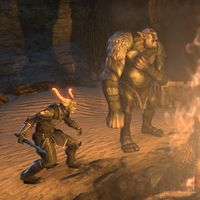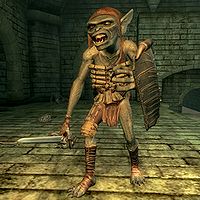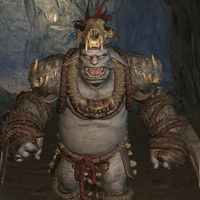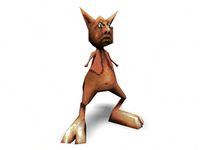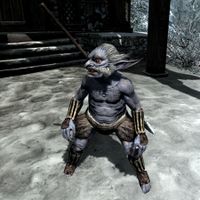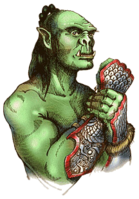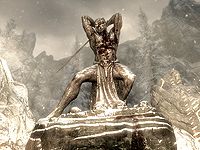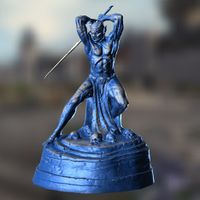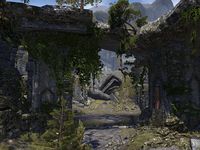Lore:Goblin-ken
Goblin-ken (also called goblin-kin or goblinkin)[1][2] is an unspecific term used to refer to several different beastfolk, including Goblins, Ogres, and Gremlins. Although they have elven blood, Orcs are widely considered to be goblin-ken due to the common belief that they are somehow related to goblins.[3][4][5] Goblin-ken have been historically used as slaves by the Altmer of Summerset Isle.[3]
Malacath is the patron of Orcs and Ogres; he considers the latter to be his "little brothers" and is known to protect and guide them.[6] The Orcs worship him as both the Daedra Malacath and the god Mauloch. The Goblins and Ogres worship a god named Muluk, or "the Blue God",[7][8] who is believed be an aspect of Malacath or Maluloch.[9][10][7] The ancient giant Goblins worshipped a deity known as Malooc,[11][12] who was believed by the Redguards to also be Maluloch.[13]
Races[edit]
Orcs[edit]
Orcs, or Orsimer, are a race that have conflicting views on their nature, with some sources considering them elven, and others claiming them to be beastfolk that predate elven arrival to Tamriel. They are the most intelligent of the goblin-ken, and openly trade with and even serve outsiders. Many Orcs are very loyal to Malacath and live a life dedicated to him.
Goblins[edit]
Goblins (also derogatorily called Gobs) are primitive humanoids found throughout Tamriel and Akavir, often living in sewers, caves, and ruins in small clan-based societies. They can range in height from three feet to over eight feet. Appearance-wise, Goblins usually have green or yellow skin (sometimes white or black), yellow eyes with slitted pupils, pronounced canine teeth, pointed elven-like ears, and sometimes horns and hunchbacks. While typically violent towards more societally developed races, Goblins are intelligent, and are capable of living in peace with others.
For more information, see the main lore article.
Rieklings[edit]
Rieklings are a race of blue-skinned ice Goblins, related to the other Goblin-ken. The most common Rieklings are small in stature and found on Solstheim, but larger Rieklings were once present on mainland Skyrim in the Second Era. They are aggressive, and can be dangerous in groups. Despite being considered little more than beasts by the local Nords, Rieklings are naturally cunning. Rieklings speak the goblin language, and can be conversed with by expert linguists. Some speak Cyrodilic, although they rarely say anything intelligible. Apart from this, they seemingly have little culture of their own. They scavenge what few relics they can find from the other races, and form strange attachments to these treasures.
For more information, see the main lore article.
Riekrs[edit]
Riekrs are a race of magically gifted white-skinned ice Goblins from the province of Wrothgar, and are related to other Goblin-ken. They are sometimes described as crossbreeds between standard Goblins and Rieklings, or as just a larger variety of Riekling. The Riekr are social creatures; each goblin is expected to be able to pull their own weight within their tribe, and those who can't are not treated kindly.
The Riekr have a unique initiation system for those who show magical capabilities where they are exiled and have to buy their way back. The mage must then wait a certain period before they are allowed to buy their way back into the tribe with a food offering such as a freshly slain deer, bear, or echatere. Once the mage buys their way back into the tribe, they quickly rise in status to become a revered member of the tribe, gaining influence with the chief.
Riekr chiefs own objects that indicate their position of power in the tribe. The Riekr known as King-Chief Edu stole and used an ancient scepter created by the Orgak Orc clan, as a symbol of his power. Another Riekr chief who was notably a spellcaster had a totem as his symbol of power.
Riekr are known to work closely with the Snow Ogres that also inhabit Wrothgar. They are said to provide their Ogre allies with weapons and armor they wouldn't normally have access to. Riekr have a mostly antagonistic relationship with the more "civilized" peoples that reside in Wrothgar, sometimes organizing raiding parties to kidnap hunters. However they have been known to welcome outsiders in their ranks as long as they smell like a Goblin. Riekr have also been known to display attraction towards Orcish women.
Like other Goblins, Riekr tame wild beasts such as feathery durzogs. Also like other Goblins, Riekr are capable of speaking Tamrielic, though often require training to do so. Some Riekr are tamed and raised to be servants, doing tasks such as setting tables.
Ogres[edit]
Ogres are a race of large humanoid goblin-ken, that are found throughout Tamriel. Best known for their great strength and foul smell, they are commonly perceived as dim-witted brutes. Ogres have steely blue or greenish skin, pronounced teeth, and tapered ears. Their large physique often garners comparisons to Giants. It has been hypothesized that their grey-blue coloration is a method of camouflage against the sky, although this speculation is considered to have been debunked. They often have shaggy white or black hair, which can cover the entire body of those found in colder regions. The Ogres in Wrothgar are sometimes called Snow Ogres, and are differentiated from common Ogres by their thick white fur. Some of these ogres use powerful frost magic.
For more information, see the main lore article.
Gremlins[edit]
Gremlins (also derogatorily called Orc-rats or Squeakers) are small, harmless creatures related to goblins, whom they can often be found living alongside. Gremlins have a distinct appearance with large feet, and tiny arms incapable of using any man-sized tools. While seen as unpleasant by most, they usually aren't met with violence like most goblin-ken. Instead, they are typically shooed away or otherwise dismissed, though some show them kindness. They are known to occasionally beg for food.
A number of gremlins and other goblin-ken lived in certain iterations of the city of Orsinium. Gremlins were also known to live in the Goblin Caverns of Stros M'Kai. Many believe that the goblin-ken of Stros M'Kai were banished beneath the earth thanks to Frandar Hunding. Some Redguards who lived there would warn goblin-ken such as gremlins to return to their caves, lest Hunding turn them into stone. Gremlins have been used as slaves by the Altmer and as familiars by some wizards in the Mages Guild, they may sometimes be kept in jars.
Gremlins have their own language, known as gremlin tongue, which is not usually understood by other races, though some words in it are coincidentally similar to other words in Tamrielic. There exists a transmogrification spell capable of transforming someone into a gremlin. This spell was a favorite trick of Jaganvir, the Archmage of the Mages Guild on Stros M'Kai circa 2E 864.
For more information, see the main lore article.
Interspecies Relations[edit]
History of Orc and Goblin-ken Relations[edit]
—Phrastus of Elinhir
There have been mentions of extinct "orcoblins",[14] which are presumably some cross between an Orc and a Goblin.
At some point during the Camoran Dynasty of the First Era, hundreds of Goblins, Orcs, Ogres, Gremlins, and other beastfolk were set free by the rulers of the Summerset Isles, and allowed to settle lands north of Valenwood. They chose to settle in an uninhabited mountain region close to Old Hroldan in High Rock, as the Orcish tribes were dependent on rare, shaggy, giant centipede herd-beasts that can only survive at high altitudes. Here, they would found the first city of Orsinium (literally translated as Orc-Town).[3] The exact dating of this event is unclear, but various pieces of evidence place the founding of Orsinium in the ninth or tenth century of the First Era.[15] Some Second Era historians believed the goblin tribes never actually lived in the city itself, instead maintaining a truce with the Orc clans in the Dragontail Mountains, but never mingling.[16]
In 1E 874, when the Orcish Warlord Thulgeg's army of Orcs and goblins was driven from Hammerfell by the Redguards, the Bretons of Bangkorai Garrison denied them passage through the Pass and forced them to flee northeast, trudging all the way through the Dragontail Mountains before they finally reached Orsinium. Not a single goblin made its way through the pickets into High Rock.[17][18]
After the first sacking of Orsinium by the Order of the Diagna and the subsequent rebuilding, Orcs would become the sole inhabitants of the city. Circa 2E 582, Orcs and the other Goblin-ken had little care for each other. The Ironhand ogres of Stormhaven were a significant military threat to the region, and impeded the Orcs efforts to rebuild Orsinium, so they were besieged and slain by the Daggerfall Covenant.[19] Priests of Malacath during this time did not consider eating Ogres to be cannibalism, and in-fact claim Ogre innards were commonly found in ancient Orc dishes.[20]
Despite past conflicts, as of 2E 864, Goblins, Ogres, and Gremlins were once again known to inhabit Orsinium.[3] Though it is unknown if this is true of later iterations of the city.
Morga the Witch, an Orc, had many Goblin followers.[21]
Mingled Tribes[edit]
Despite their complicated history with Orcs, the other Goblin-ken species much more commonly mingle with each other. Ogres are commonly known to intermingle with Goblin tribes,[22][23] often ranking high in them.[8] Goblins, Gremlins, and Ogres were all known to inhabit the Goblin Caverns of Stros M'Kai.[24] The Riekr and Snow Ogres of Wrothgar are known to work closely with each other. The Riekr are said to provide their Ogre allies with weapons and armor they wouldn't normally have access to.[UOL 1]
Gallery[edit]
Notes[edit]
- Although not goblin-ken, Goblin tribes have been observed to have Trolls,[25] Minotaurs,[26] and even Bretons in their ranks.[27]
- The related term "riekr-kin" has sometimes been used by the Nords to refer to the deformed remnants of the Falmer, believing them to be some form of ice goblin related to the riekr.[28]
- Back when Orcs were still considered unintelligent monsters at the time of Arena, it was said that scholars have often speculated that Goblins and Orcs are somehow related, with some stating that Orcs are just larger versions of Goblins.[4]
References[edit]
- ^ The Ice Elder of the Ogres
- ^ Humanoid Slayer achievement in ESO
- ^ a b c d Pocket Guide to the Empire, 1st Edition: The Wild Regions — Imperial Geographical Society, 2E 864
- ^ a b Arena Player's Guide description of Orcs
- ^ Gathering Force: Arms and Armor of Tamriel, The Goblin Filth, Grutbug the Unhealthy
- ^ Malacath's dialogue in Oblivion
- ^ a b Letter to Clexius — Avanessa Calladius
- ^ a b Servants of the Blue God quest in Blades
- ^ Children of Muluk quest in Blades
- ^ Sacred Rites of the Stonechewers — Nellic Sterone
- ^ Varieties of Faith... — Brother Mikhael Karkuxor of the Imperial College
- ^ The Improved Emperor's Guide to Tamriel: Elsweyr — Flaccus Terentius, 2E 581
- ^ Discussion with Abal at-Inzil, priest of Tava — Abal at-Inzil
- ^ Jester dialogue in Arena
- ^ Wayrest, Jewel of the Bay — Sathyr Longleat
- ^ Antique Map of Bangkorai's antiquity codex entries in ESO
- ^ Bangkorai, Shield of High Rock — King Eamond
- ^ Thulgeg's March — Kraltha the Rememberer
- ^ Events of Ending the Ogre Threat in ESO
- ^ Orzorga's comments about Numakelurruz the Radish-Eater in Thicker Than Water in ESO
- ^ The Goblins' Demands event in Castles
- ^ The Ogre in Redguard
- ^ Ogres in ESO
- ^ Brennan, Coyle, and Mariah's dialogue in Redguard
- ^ Icestalker in ESO
- ^ Kinras Ironeye in ESO
- ^ Goblin Jim in Oblivion
- ^ Monsters of Northern Folklore — Minerva Calo, Imperial Chronicler
Note: The following references are considered to be unofficial sources. They are included to round off this article and may not be authoritative or conclusive.
- ^ Twitch Stream of Orsinium Special, time stamp 18:02-19:08
|
|||||||||||||||||||||||||||||||||||||||||||
